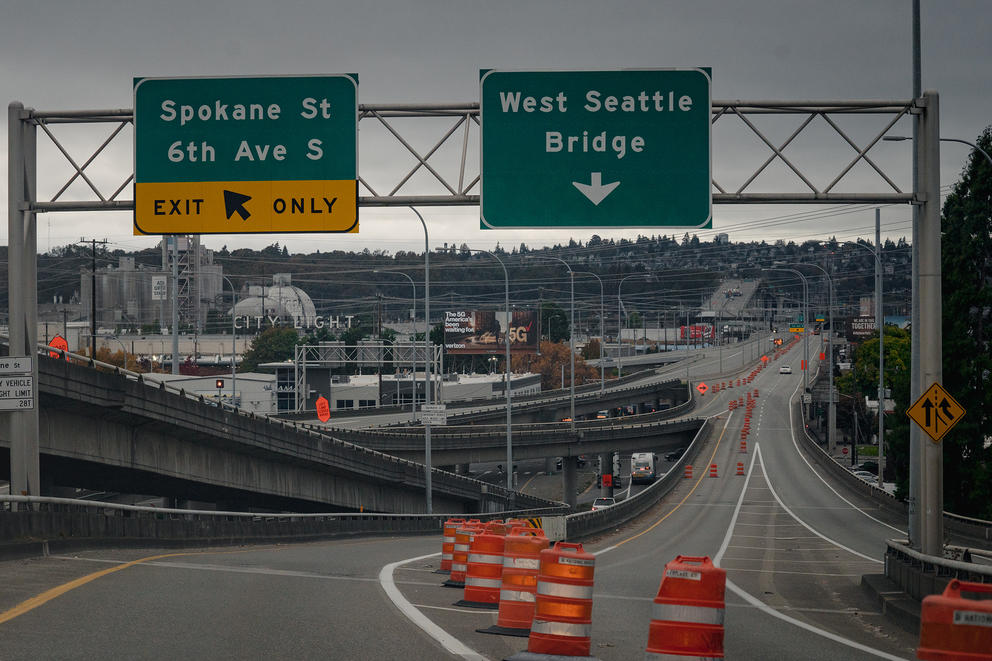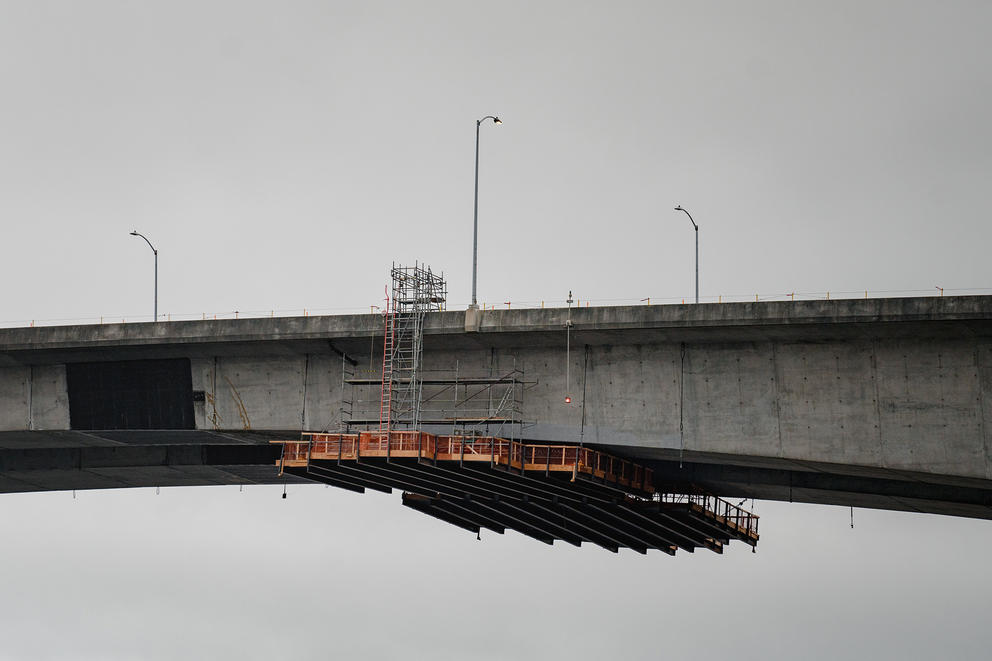Hazelo is challenging 20-year Democratic incumbent Rick Larsen, who was in office when the bridge collapsed. In response, the congressman secured $15.6 million in federal funding for emergency repairs, which helped the bridge reopen within a month of the catastrophic failure. He later supported the Strengthen and Fortify Existing (SAFE) Bridges Act, which directed the U.S. Department of Transportation to assist states in shoring up failing bridges.
This kind of congressional action is the meat and potatoes of infrastructure policy, which is seen most acutely when something dramatic happens, like a bridge collapse. The same kind of saga is on display today with the sudden closure this year of the West Seattle Bridge because of structural deficiencies.
Infrastructure may not be the top issue voters are thinking about when they fill out their ballots this fall, but next year’s Congress will make decisions that affect many Washingtonians more than any other issue: from the West Seattle Bridge to the proposed new I-5 bridge over the Columbia River.
Last year, the American Society of Civil Engineers gave Washington a “C” grade for its infrastructure, above the national “D+.” Piggybacking on that middling mark, a coalition of state trade groups came together last year in a report that estimated the state’s infrastructure needs at $222 billion, which, if fully funded, would generate up to 770,000 jobs.
But with the state facing a massive budget shortfall, finding those triple-digit billions will require much assistance from the other Washington. That’s no mean feat given that “Infrastructure Week” became a Capitol Hill punchline for ineffective policymaking during this administration.
“There is no way the state has the capacity to fund the full amount so we absolutely need help from the federal government to meet that funding need,” said Mike Ennis, director of government affairs with the Association of Washington Businesses, one of the groups that sponsored the report. “And our congressional delegation is the one who fights for funding for our state.”
While collapsing bridges garner headlines, Ennis points out that infrastructure covers a wide range of projects: from transportation to broadband, water supply, water quality, ports, economic development, communications and energy.
While the Republican-controlled Senate and White House killed the $1.5 trillion Moving Forward Act passed in July by the Democrat-controlled House. A version of the act could be revived if the balance of power in Washington, D.C., changes after the election. In the meantime, infrastructure dollars continue to trickle out. On Oct. 12, Democratic U.S. Sen. Patty Murray, a senior member of the infrastructure and transportation appropriations subcommittee, announced $10 million for the Port of Seattle and $7 million for the Port of Bellingham secured through a competitive grant.
But neither of Washington’s U.S. senators is up for reelection this year. Instead, Crosscut checked in with candidates from five Congressional districts covering a diverse cross section of the state in order to see where they stand on key infrastructure issues.
2nd District: Incumbent Rick Larsen (D) vs. Tim Hazelo (R)
3rd District: Incumbent Jaime Herrera Beutler (R) vs. Carolyn Long (D)
5th District: Incumbent Cathy McMorris Rodgers (R) vs. Dave Wilson (D)
6th District: Incumbent Derek Kilmer (D) vs. Elizabeth Kreiselmaier* (R)
10th District: Marilyn Strickland (D) vs. Beth Doglio* (D)
*Did not respond to requests for comment
Planes, trains and automobiles
Infrastructure encompasses more than just transportation, but roads, bridges, train tracks and airports are among the most obvious signs of public infrastructure investment. Incumbents on both sides of the aisle touted their records for bringing home the dollars.
In Eastern Washington, incumbent McMorris Rodgers hailed her ability during the Trump administration to deliver $160 million for airports, $1.25 million for a grade separation project on BNSF tracks, and $3 million for the Spokane Transit Authority. She declined to comment on the Route 395 North Spokane Corridor North-South Freeway or the Spokane Central City Line BRT, which challenger Wilson highlighted as important to the district.
In the South Sound, incumbent Derek Kilmer claimed credit for securing federal funding to expand Link light rail in Tacoma, while Marilyn Strickland leaned on her prior role as vice chair of Sound Transit overseeing one of the largest public transit expansions in the U.S. The former Tacoma mayor also underlined the importance of funding the Puget Sound Gateway Program in order to improve freight delivery from Eastern Washington to the Port of Tacoma, which she insists will have statewide economic benefits. “It is so much more than a regional project,” she said.
In southwest Washington, the I-5 bridge that connects Washington and Oregon over the freight-heavy Columbia River has been a perennial issue. The northbound span closed for nine days in September for maintenance on the bridge's raising and lowering mechanism. Chronic maintenance needs plague the century-old bridge. Meanwhile, the southbound span is north of the half-century mark. Last year, Washington Gov. Jay Inslee and Oregon Gov. Kate Brown signed an agreement to replace the bridge, rekindling an effort that fell flat in 2013 when the Washington Senate nixed a proposed replacement plan.
Incumbent Jaime Herrera Beutler favors upgrading over replacing. She warned against “top-down dictation” from federal officials and transportation bureaucrats and insisted that voters in her district do not want light rail expansion from Portland into Vancouver. She also took a firm stand against plans from Metro, greater Portland’s regional government, to implement congestion pricing tolls. Challenger Carolyn Long hopes to serve on the House transportation and infrastructure committee and champion a replacement bridge. “We need someone who’s going to be dedicated to this issue and fight hard to bring people together to get a plan in place that works for Washington residents, rather than just giving up when the going gets hard,” she said.
Rick Larsen, who says he continues to ride public transit regularly both in D.C. and back in his district, acknowledged the fiscal strain facing his district’s transit agencies, including Island Transit and Community Transit. He pointed to the Coronavirus Aid, Relief and Economic Security, or CARES Act, and the Health and Economic Recovery Omnibus Emergency Solutions, or HEROES Act, both of which were intended to provide relief to public transit earlier this year. Challenger Tim Hazelo was more skeptical. “I think [public transit] is needed and a good way to provide for people who want to use and or have to use it,” he said. “Once again, though, as you look at the buses for instance in Seattle, they are everywhere and most have little to no riders most of the time.” (Seattle is not in the 2nd District.)
Ferries
Washington State operates the largest ferry fleet in the U.S., but looming state budget cuts imperil some routes. The Anacortes-Sidney, B.C. route may be on the chopping block — it hasn’t run since the U.S. and Canada closed their border to nonessential travel during the coronavirus pandemic — as is the Port Townsend-Coupeville run. While the ferries are a unique part of the Puget Sound lifestyle, they cost money to run. Will representatives in Congress from districts with significant ferry service step in to keep them afloat?
“Ferry service is a necessity, not a luxury,” insisted Larsen, who is pinning his hopes on the Moving Forward Act to invest $245 million in passenger ferries nationwide over the next five years. He inserted a specific provision to pay for grants for zero- and reduced-emission ferries, like the proposed electric ferry to Guemes Island, as well as the broader state plan to convert existing diesel vessels to hybrid-electric ferries. Kilmer claimed credit for a Department of Transportation grant specifically for the Seattle-Bainbridge Island route to convert one vessel to hybrid electric.
“I can't imagine not having the Port Townsend ferry so I will continue to support the ferry system,” said Hazelo. “[I’m] just looking for a way to make the whole thing more efficient. As for the Sidney ferry, I would imagine that would be as important to us as it is to Sidney. Maybe we need to find a way to share the cost if it's not already happening.”
Culverts
In 2018, the U.S. Supreme Court upheld an Appeals Court ruling that Washington state is on the hook to repair or replace $3.1 billion worth of culverts that impede fish passage, adding yet another task to a state Legislature facing an economic shortfall.
Some incumbents already are looking for U.S. government financial intervention to ease the burden, given the considerable amount of federal land in the state. Kilmer highlighted the Great American Outdoors Act, which was signed into law this year, for funneling significant dollars into deferred maintenance on federal land, including culverts. He also took credit for introducing a bill authorizing the Legacy Roads and Trails program, which would stormproof forest roads by, among other efforts, upgrading culverts. The bill was eventually folded into the larger Moving Forward Act, which remains stalled in the Senate.
Larsen pointed to the Water Resources Development Act of 2020, where he claims to have inserted language that expands funding for so-called “nature-based aquatic ecosystem restoration” for salmon and steelhead passage. The bill remains stalled in Congress, however.
Both Herrera Beutler and Long sidestepped the culvert issue. Herrera Beutler pointed to her track record securing appropriations through the Pacific Coastal Salmon Recovery Funds and boosting funds for the Mitchell Act, a 1938 law that created the fish hatchery system throughout the Columbia River basin. Long talked about increasing the amount of water flowing over dams and the impacts of climate change.
Hazelo, a self-described “fish guy,” was dismissive of the issue. “There are much bigger problems with our fish resources in Washington than these culverts,” he said.
Broadband
With many Washingtonians working and schooling from home, reliable broadband internet has surged to the forefront as a potential infrastructure issue. While metropolitan areas are largely well serviced, exurban and rural areas lag behind, given the diminishing returns for broadband providers to invest in expensive fiber optics to serve a relatively small number of households.
Much of the debate, in turn, hinges on whether broadband is a utility. Strickland certainly thinks so. “I consider broadband a core pillar of our regional and national infrastructure,” she said. “Like water and electricity, fast and reliable broadband is a utility, and it should be regulated as such.” She touted her ultimately unsuccessful effort as mayor of Tacoma to keep the city’s Click! Network publicly owned as evidence of her commitment to broadband as a public utility.
The urgency of broadband appears to be bipartisan, as Herrera Beutler similarly hailed her work on the House Appropriations Committee to secure $990 million for the U.S. Department of Agriculture’s ReConnect Program, which lends money for rural broadband development, as well as her co-sponsorship of the Rural Broadband Acceleration Act. Challenger Long described her platform as “broadband for all,” pointing out that 84% of Wahkiakum County residents don’t have broadband access.
McMorris Rodgers, meanwhile, pointed to her role in the Broadband DATA (Deployment Accuracy and Technological Availability) Act, signed into law during this Congress, which fixes outdated broadband maps.
Her challenger, Wilson, sees broadband as an economic development issue for the 5th District because of trends toward remote worker relocation. “If you build it, they will come,” he said. “If you have it, it can bring in high-wage workers to anywhere in the district.” However, Wilson declined to specify any specific legislation he would support to pursue that goal, claiming that broadband has not been a pressing issue in the race.
Other challengers are not ready to put broadband on the same plane as water and electricity. “I am a victim of bad internet; however, I do not feel that it is a part of the overall infrastructure of our nation,” said Hazelo. “It is a good place to look for improvement and incentivize private businesses to enhance the coverage. But for the government to take over another industry is just another step towards the socialism we have been fighting against for years.”
Water quality and disaster recovery
The American Society of Civil Engineers lobbies Congress on key infrastructure programs, keeping an eye on the wonky but essential funds and programs that keep federal dollars flowing. The nonpartisan infrastructure champions have zeroed in on the Clean Water State Revolving Fund and Drinking Water State Revolving Fund, two long-term programs that loan money from the federal government to the states, as well as the newly proposed Resilience Revolving Loan Fund, which would support rebuilding after disasters. The former two need to be reauthorized, as they are in jeopardy of expiring after 30 years, while the latter would be a new program.
These obscure but important federal programs require congressional action or risk death by inertia, a fate that has befallen otherwise popular programs that benefit Washington in an increasingly gridlocked Congress.
In the case of these revolving loan funds, most of the candidates are on board. Herrera Beutler, Kilmer, Larsen, Long and Strickland all gave unqualified support for the three funds, signaling bipartisan support among the state’s congressional delegation. Strickland, vying for a seat, also supported all three. Challengers Hazelo and Wilson declined to comment as they were not familiar with the programs. Incumbent McMorris Rodgers, meanwhile, sidestepped the funds and instead pointed to the Safe Drinking Water Assistance Act, which she introduced this session.
Crosscut is working to get you the information you need to cast your ballot this November. If you have questions about Washington state candidates and issues, submit them here. If you’re wondering about the process of voting, you can direct those questions here. To submit a tip about a voting-related problem you want us to investigate, please go here.




